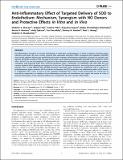Anti-Inflammatory Effect of Targeted Delivery of SOD to Endothelium: Mechanism, Synergism with NO Donors and Protective Effects In Vitro and In Vivo

View/
Author
Shuvaev, Vladimir V.
Han, Jingyan
Tliba, Samira
Arguiri, Evguenia
Christofidou-Solomidou, Melpo
Ramirez, Servio H.
Dykstra, Holly
Persidsky, Yuri
Muzykantov, Vladimir R.
Note: Order does not necessarily reflect citation order of authors.
Published Version
https://doi.org/10.1371/journal.pone.0077002Metadata
Show full item recordCitation
Shuvaev, V. V., J. Han, S. Tliba, E. Arguiri, M. Christofidou-Solomidou, S. H. Ramirez, H. Dykstra, et al. 2013. “Anti-Inflammatory Effect of Targeted Delivery of SOD to Endothelium: Mechanism, Synergism with NO Donors and Protective Effects In Vitro and In Vivo.” PLoS ONE 8 (10): e77002. doi:10.1371/journal.pone.0077002. http://dx.doi.org/10.1371/journal.pone.0077002.Abstract
Pro-inflammatory activation of vascular endothelium is implicated in pathogenesis of severe conditions including stroke, infarction and sepsis. We have recently reported that superoxide dismutase (SOD) conjugated with antibodies (Ab/SOD) that provide targeted delivery into endothelial endosomes mitigates inflammatory endothelial activation by cytokines and agonists of Toll-like receptors (TLR). The goal of this study was to appraise potential utility and define the mechanism of this effect. Ab/SOD, but not non-targeted SOD injected in mice alleviated endotoxin-induced leukocyte adhesion in the cerebral vasculature and protected brain from ischemia-reperfusion injury. Transfection of endothelial cells with SOD, but not catalase inhibited NFκB signaling and expression of Vascular Cell Adhesion Molecule-1 induced by both cytokines and TLR agonists. These results affirmed that Ab/SOD-quenched superoxide anion produced by endothelial cells in response to proinflammatory agents mediates NFκB activation. Furthermore, Ab/SOD potentiates anti-inflammatory effect of NO donors in endothelial cells in vitro, as well as in the endotoxin-challenged mice. These results demonstrate the central role of intracellular superoxide as a mediator of pro-inflammatory activation of endothelium and support the notion of utility of targeted interception of this signaling pathway for management of acute vascular inflammation.Other Sources
http://www.ncbi.nlm.nih.gov/pmc/articles/PMC3795626/pdf/Terms of Use
This article is made available under the terms and conditions applicable to Other Posted Material, as set forth at http://nrs.harvard.edu/urn-3:HUL.InstRepos:dash.current.terms-of-use#LAACitable link to this page
http://nrs.harvard.edu/urn-3:HUL.InstRepos:11878887
Collections
- HMS Scholarly Articles [17922]
Contact administrator regarding this item (to report mistakes or request changes)


